
RENCI and its partners, the iRODS Consortium and the National Consortium for Data Science, will feature their work in an exhibit at SC14, the world’s premier conference for high performance computing, networking, storage, and analysis.

RENCI and its partners, the iRODS Consortium and the National Consortium for Data Science, will feature their work in an exhibit at SC14, the world’s premier conference for high performance computing, networking, storage, and analysis.
 CHAPEL HILL, NC, November 10, 2014, 2014 – Seagate Technology, a world leader in storage solutions, is the latest corporation to join the iRODS Consortium, a group that supports and guides the continued development of the integrated Rule-Oriented Data System, or iRODS.
CHAPEL HILL, NC, November 10, 2014, 2014 – Seagate Technology, a world leader in storage solutions, is the latest corporation to join the iRODS Consortium, a group that supports and guides the continued development of the integrated Rule-Oriented Data System, or iRODS.
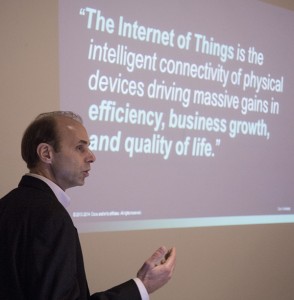
Russ Gyurek of CISCO Systems speaks at an NCDS Tech Talk at UNC-Chapel Hill.
CHAPEL HILL, NC – The Internet of Everything is here, it’s big and growing exponentially, and it promises to transform society even more dramatically than previous disruptive technologies, including the Internet and electricity.
That was one of the key messages at an NCDS Tech Talk Oct. 23 in Sitterson Hall at UNC Chapel Hill. Cosponsored by UNC University Career Services, the talk featured Russ Gyurek, director of innovation in the office of the CTO at CISCO Systems, an NCDS member organization, talking about the next big thing in big data.
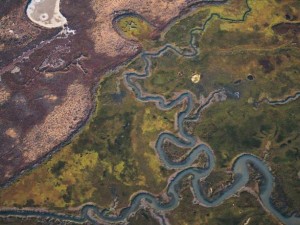 CHAPEL HILL, NC – Sharing hydrologic data and models is getting easier, thanks to Hydroshare, a Web-based collaborative environment that expands the data sharing capabilities of the Consortium of Universities for the Advancement of Hydrologic Science, Inc. (CUAHSI) Hydrologic Information System (HIS).
CHAPEL HILL, NC – Sharing hydrologic data and models is getting easier, thanks to Hydroshare, a Web-based collaborative environment that expands the data sharing capabilities of the Consortium of Universities for the Advancement of Hydrologic Science, Inc. (CUAHSI) Hydrologic Information System (HIS).
The first version of HydroShare, developed by RENCI with input from a large community of scientists and software engineers, is now available on the HydroShare website. The HydroShare beta version allows hydrologists and other scientists studying water-related issues to easily upload data from their research projects, add metadata about the data files, and contribute related links, papers and source data.
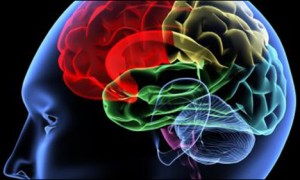 CHAPEL HILL, NC – A study led by University of North Carolina at Chapel Hill researchers represents an important step forward in the accurate diagnosis of people who are experiencing the earliest stages of psychosis.
CHAPEL HILL, NC – A study led by University of North Carolina at Chapel Hill researchers represents an important step forward in the accurate diagnosis of people who are experiencing the earliest stages of psychosis.
Psychosis includes hallucinations or delusions that define the development of severe mental disorders such as schizophrenia. Schizophrenia emerges in late adolescence and early adulthood and affects about 1 in every 100 people. In severe cases, the impact on a young person can be a life compromised, and the burden on family members can be almost as severe.
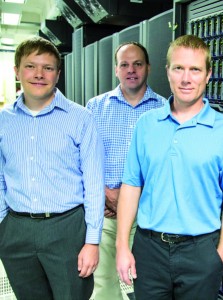
From left to right: RENCI’s Casey Averill, Brian Blanton and John McGee
When hurricanes or tropical storms head toward the North Carolina coast, RENCI’s Dell PowerEdge cluster, called Hatteras, springs into action, producing finely-detailed models of possible storm tracks and resulting coastal storm surge several times a day.
A recent upgrade to Hatteras means more capacity to produce a large number of storm surge forecast ensembles and high-resolution models in less than three hours. The effort to upgrade Hatteras was documented in a recent case study developed by Dell.
For more on RENCI’s coastal modeling work, see Coastal Hazards Modeling web page.
Forty-five students from around the globe spent the last three weeks in classrooms at RENCI in Chapel Hill and at the National Center for Ecological Analysis and Synthesis (NCEAS) at the University of California, Santa Barbara, learning the software and technology skills needed for open, collaborative, and reproducible synthesis research.
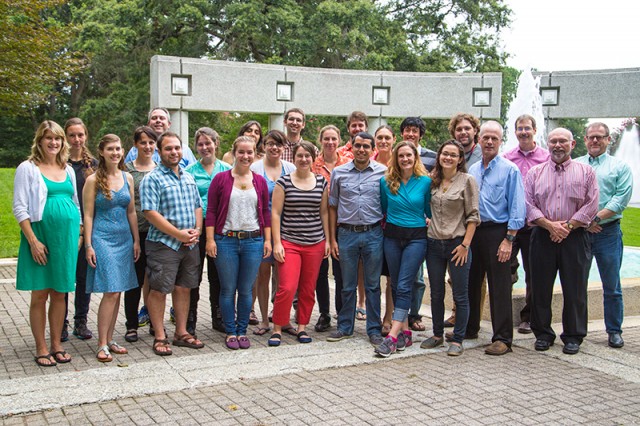
Participants and instructors in the RENCI portion of the Open Science for Software course pose for a group photo on the final day of class.
With many large data sets, place is an important component. From the emergency manager looking for the best evacuation route to the historian trying to understand urban development patterns over the years, people rely on geographically referenced data to meet a variety of research, business, and government needs.
RENCI’s Geoanalytics platform provides intuitive, map-based visualizations to help transform data into decisions. Among other applications, this free, open source software has been used to inform disaster response, study the spread of disease, and increase the accessibility of public records.
To learn more, read the RENCI Geoanalytics White Paper or visit the Geoanalytics@RENCI website.
CHAPEL HILL, NC and SANTA BARBARA, CA – A unique training course that will take place simultaneously on both U.S. coasts will get underway July 21 at RENCI headquarters in Chapel Hill, NC, and at the National Center for Ecological Analysis and Synthesis (NCEAS) at the University of California, Santa Barbara.
Open Science for Synthesis (OSS) is aimed at early career scientists who want to learn new software and technology skills needed for open, collaborative, and reproducible synthesis research. The three-week intensive program will run through August 8, with 45 participants who completed a competitive application process participating in the program.
 CHAPEL HILL, NC – REACH NC, a Web portal that connects businesses, developers, government officials, other researchers and citizens to thousands of experts working in higher education and research institutions throughout North Carolina, now helps users find university assets and resources across the state through a new tool called the REACH NC Resource Finder. Read more
CHAPEL HILL, NC – REACH NC, a Web portal that connects businesses, developers, government officials, other researchers and citizens to thousands of experts working in higher education and research institutions throughout North Carolina, now helps users find university assets and resources across the state through a new tool called the REACH NC Resource Finder. Read more